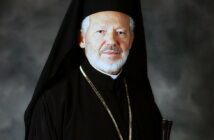Source: Public Orthodoxy
Talia Zajac
Assistant Professor of Religious Studies at Niagara University
I first heard the rumor’s confirmation as I was heading out the church door. The cantor was saying goodbye to me and added with a half-smile that change was inevitable. The Julian calendar was bound to fall behind the Gregorian calendar, he said, so much that Christmas according to the two calendars eventually would be celebrated hundreds of days apart, instead of the current difference of thirteen days. I knew then that the rumor was true. Parishioners and priests had whispered for years that the Ukrainian Greek Catholic Church, the largest sui iuris Eastern-rite church in communion with Rome, would soon be switching from the Julian to the Gregorian calendar. Christmas would now be celebrated on December 25 rather than January 7, with the solemn night of Christmas Eve falling on December 24 rather than January 6.
When Pope Gregory XIII issued his eponymous calendrical reform on February 24, 1582 CE, he added ten days to the calendar first devised by Julius Caesar around 45 BCE to bring the calendar closer to the solar year.[1] Over the centuries, calculating by less accurate Julian Calendar has resulted in a current difference of thirteen days between the two. The Julian calendar needed correction, so why not simply adapt the Gregorian Calendar now, the cantor had told me, and have done with it? It would have to be done eventually. My husband responded with an equal half-smile that if we just waited long enough the dates of Christmas in the Julian and Gregorian calendars eventually would sync up again. I was not feeling so jokey, but I could not at first identify what my feelings were when the calendrical change was announced last February, even though the hierarchs of the Ukrainian Catholic Church agreed (for now) only to change calendars for immoveable feasts (that is, feasts like Christmas rather than Easter), beginning on September 1, 2023. The Ukrainian Orthodox Church of Canada has also announced that they are changing their dating of Christmas. As a result, my Ukrainian-Canadian friends, family and I find ourselves celebrating Christmas on December 25 this year, for the first time in our lives.
On an intellectual level, I accept the change, of course, as perfectly logical. I agree that far more important than mere exactness in counting of minutes and seconds, is unity with other Christians. Most Christians have long since made the change to Gregory XIII’s calendric reforms. The Gregorian calendar was first adapted by western Catholic countries in the sixteenth century, by Protestant countries such as Britain in the eighteenth century, while most Orthodox-majority countries in Eastern Europe adopted the Gregorian calendar for civil dating in the early twentieth century.[2]
What a beautiful Christian show of unity and shared statement of belief in the Incarnation of Christ, when carols ring out in different languages and musical traditions around the world on December 25 and church services of all kinds take place, celebrating in unison the birth of the Savior. “Why then,” said a Ukrainian Catholic priest to me, more than two years ago, “do we Ukrainians celebrate Christmas on another day, like some kind of strange sect?”
I know, too, that the date itself doesn’t truly matter. We don’t really know when Christ was born. The 25th of December was chosen probably for symbolic reasons of light triumphing over the darkness of the year, and to replace the ancient Roman celebrations of Saturnalia and the birthday of the Persian god Mithras, whose cult became widespread across the Roman world in the second and third centuries CE, especially in the Roman army. To attribute too much significance to the date of Christmas itself, as another priest reminded me, is to focus on the externals of belief and not on its fundamentals, our faith in Christ.
And yet, and yet. I came to realize that it is mourning that I feel, a grief for centuries of tradition coming to an end in my lifetime. Having a separate calendar has been a long-held part of my identity as a Ukrainian Canadian and I know that I am not alone in feeling this loss. Families of mixed Ukrainian and non-Ukrainian heritage find it convenient to have two Christmases: there was never any worry about whether we should celebrate with parents or in-laws each year, whether to serve roast beef and Yorkshire pudding for Christmas Eve, or the twelve traditional meat-free dishes including varenyky, borsch, and kutia following a solemn day of fasting. We could read Charles Dickens’ Christmas Carol and listen to A Festival of Nine Lessons and Carols from King’s College on the radio on December 24, and on January 6 search for the first star in the sky to break our fast on Sviat Vechir, Holy Evening, before solemnly singing the Ukrainian Christmas hymn “God Eternal.” Two Christmases meant that was no need for cultural code-switching, compromise, or change. Since 2017, Ukrainians, not just in the diaspora, but also in Ukraine have been able to celebrate two Christmases, when December 25 was declared a state holiday alongside January 7.
Growing up, I cheered whenever I saw Christmas lights in park trees or on houses still on for January 7. I proudly told my friends at elementary school that I followed a most ancient calendar, a calendar invented by Julius Caesar himself. The deep antiquity and long continuity of the Julian Calendar itself awed me—2,000 years of keeping time in this way!
As I grew older, I appreciated, too, the focus on Christ’s birth that celebrating Christmas on January 7 provided. By this point, the commercial rush with its endless advertisements, saccharine songs about reindeers and sleighs and obligations of holiday parties with all their over-indulgences of food and drink, had long ended. Celebrating Christmas on January 7 provided a focus on the Christ-child with no other commercial or social distractions.
For many Ukrainians living in the diaspora, following a separate calendar was also a form of preserving identity and culture. This was the case with Ukrainian diasporic communities in Canada, in the United Kingdom, or in Poland, to name a few countries. Keeping separate holidays, different saints’ days, helped bind religion, language, and culture together in a way that preserved a distinct sense of being Ukrainian amid assimilation pressures facing any minority diaspora groups. And I know, intellectually, too, that it is not only because a calendrical change is needed, but for this reason of simple survival— as a church, a people, and a sovereign nation— that the hierarchy of the Ukrainian Catholic Church has decided that now is the time to make the calendrical change from the Julian to the Gregorian. To survive now means that Ukrainians have to distinguish themselves in a new way. And so, while I get ready to celebrate on December 25 and try to remember that Saint Philip’s Fast was supposed to have begun already on December 15, and that I must make my Christmas dishes early this year, I also mourn. I mourn for the state of war in the world, I mourn for the lives needlessly and brutally taken this year, I mourn for the loss of a tradition of timekeeping stretching back thousands of years, for the joy and sense of unique identity this tradition brought to me, my family, and the wider Ukrainian community. It is one more thing Putin has taken. In this regard, Nadiyka Gerbich and Yaroslav Hrytsak in their recent book Ukrainian Christmas offer a poignant reflection on this ongoing war, “This war has been described in different ways, but here is the definition we offer: the country where Christmas is one of the most significant holidays of the year and is celebrated twice […] was attacked by the country where Christmas has lost all meaning.”[3]
[1] C. R. Cheney, ed., A Handbook of Dates for Students of British History: New Edition, revised by Michael Jones, Royal Historical Society Guides and Handbooks 4 (Cambridge: Cambridge University Press, 2004), 17-18.
[2] For a comparative chart of dates in which individual countries adopted the Julian calendar see Cheney, ed., A Handbook of Dates, table 12, 236-241 (Ukraine is not included).
[3] Nadiyka Gerbich and Yaroslav Hrytsak, A Ukrainian Christmas, trans. Marta Gosovska and Anastasiya Fehér (London: Sphere, 2022), 9.
Public Orthodoxy seeks to promote conversation by providing a forum for diverse perspectives on contemporary issues related to Orthodox Christianity. The positions expressed in this essay are solely the author’s and do not necessarily represent the views of the editors or the Orthodox Christian Studies Center.




